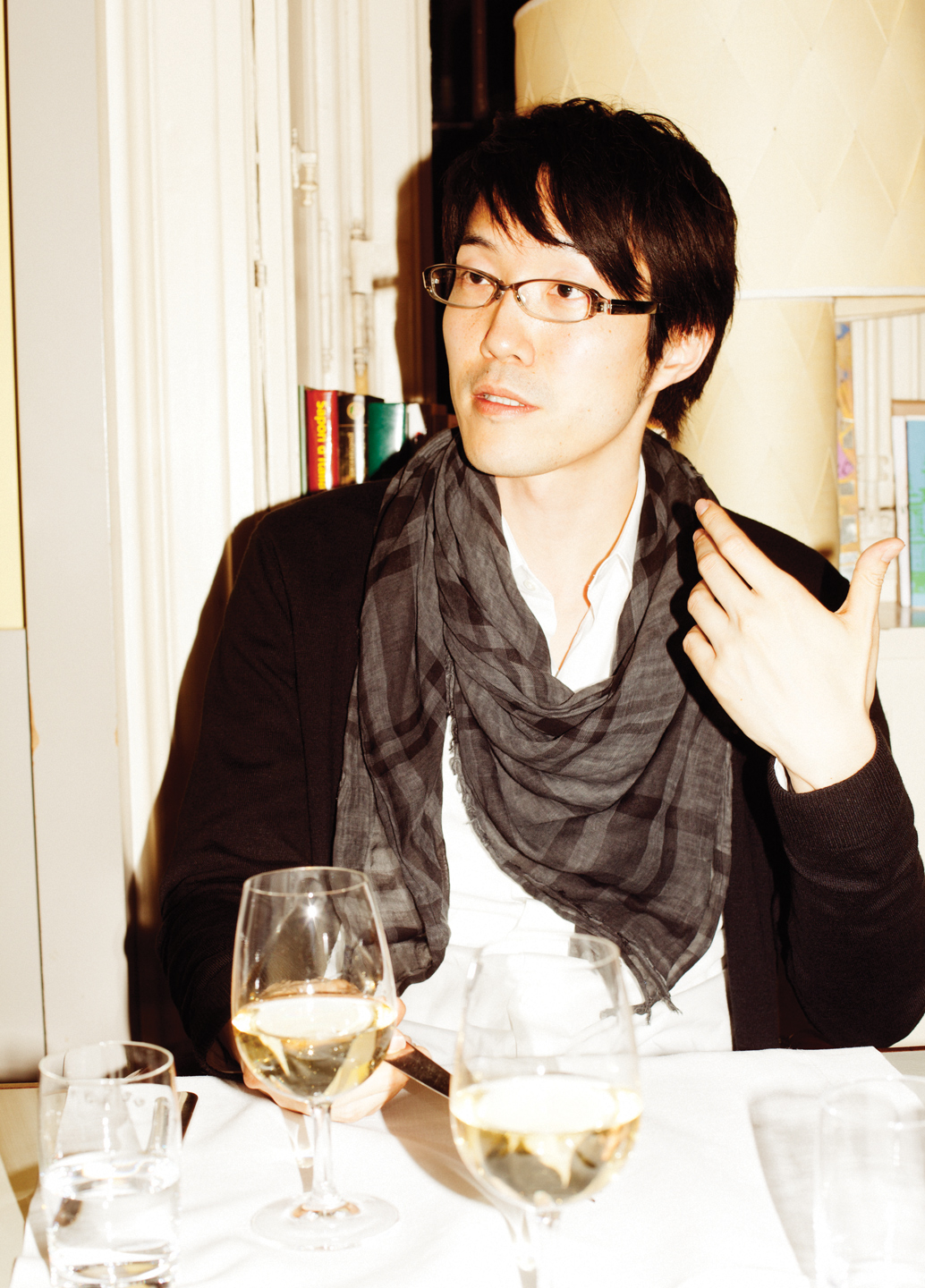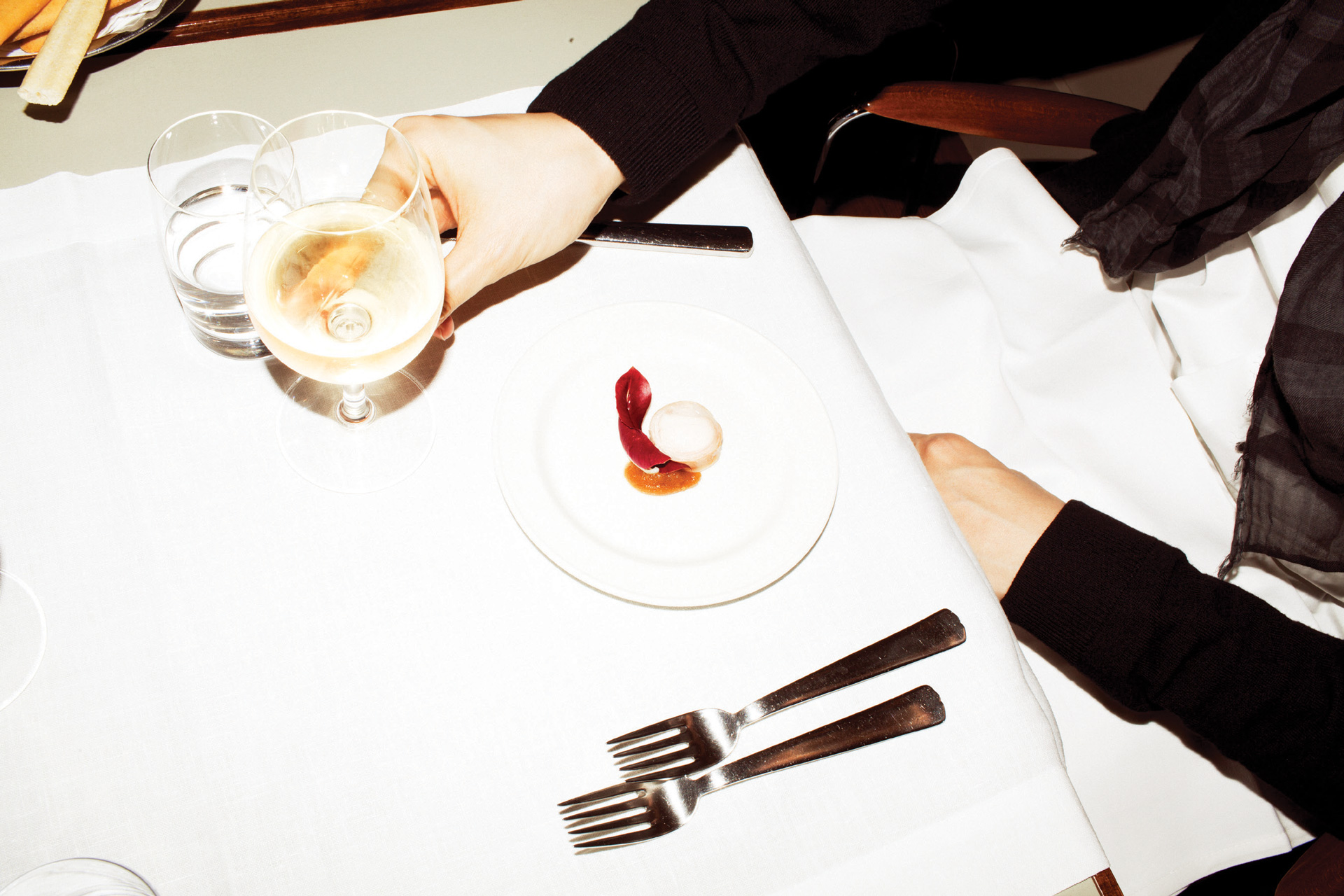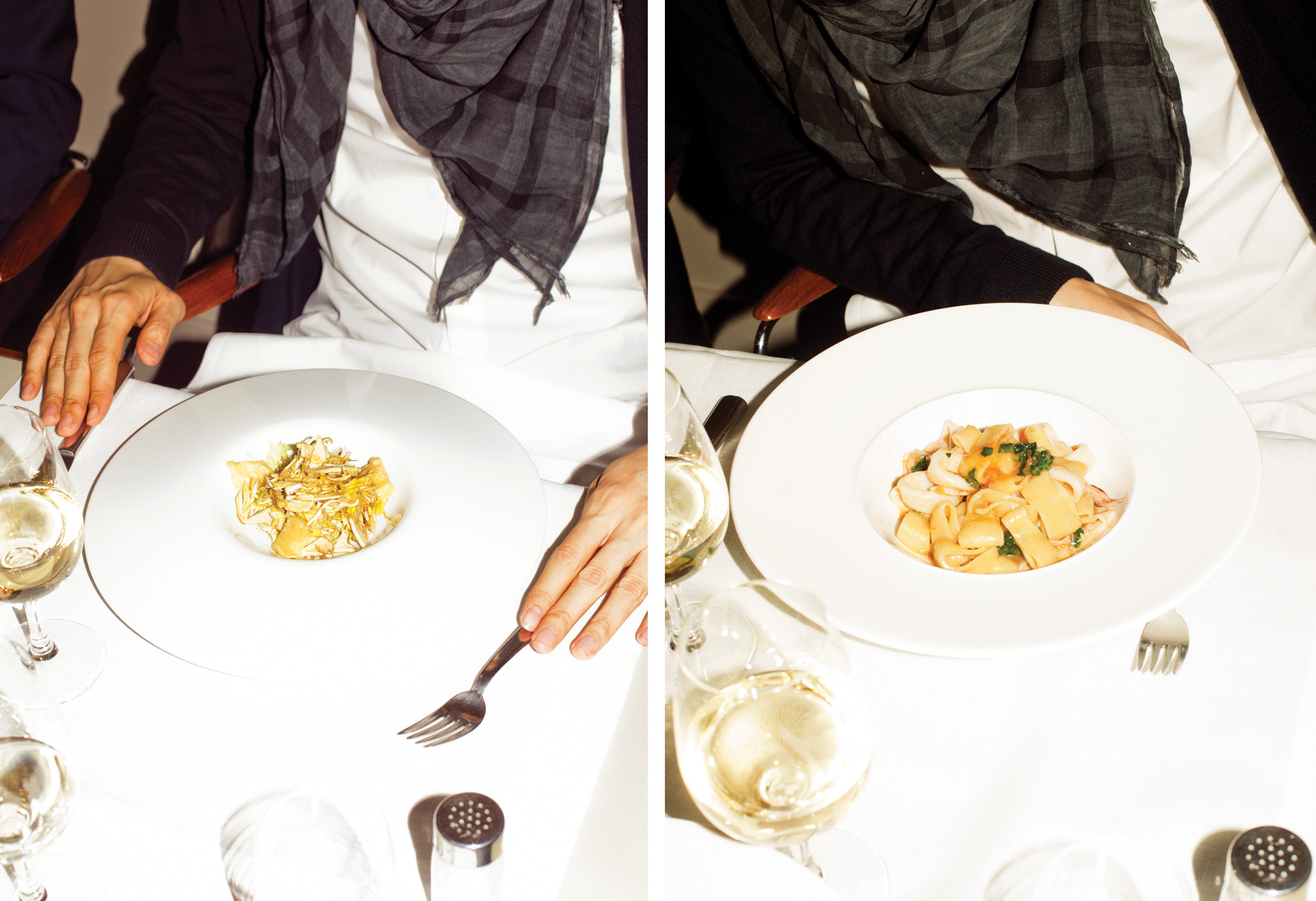Dinner with Oki Sato
At Timè Via San Marco 5 Milano
Conversation with Enrico Pompili and Fabiana Fierotti Photography Luca Campri

-
FFIs it your first time at Timè?
-
OSNo, it’s my favourite restaurant in Milan, but I haven’t managed to come here for the past few months, we have been so busy running around, eating panini on the go!
-
EPThat’s not Italian-style at all!
-
OSNo, we haven’t eaten Italian-style once.
-
The waitress comes
-
FFWhat are you having?
-
OSI think I’ll have a starter, the artichoke salad, and [he asks his assistant if they have enough time] the squid pasta.
-
EPThe same please! And shall we have some white wine?
-
OSYes please.
-
We choose a Verdicchio del Castello di Jesi
-
EPWe have just come from your COS installation, it was a great success. The city is buzzing about this COS Salone tote bag; it’s become the icon of this year’s Design Week!
-
Laughter
-
FFI’ve been carrying mine around all week!
-
EPWhat was it like working with COS?
-
OSVery easy. They sent me an email, we met to discuss doing a project for Design Week with an open brief, but the problem was time as the schedule was very tight. We met in London, shortly before Christmas, then we found a spare minute in January and we had the prototypes ready for February/March. It was very smooth in a way. The fashion industry is very quick.
-
FFSometimes miracles happen!
-
Laughter
-
EPCOS seems very organised.
-
OSYes.
-
EPWell, they are Swedish. I imagine the combination of Sweden and Japan would have excellent results.
-
OSYeah yeah yeah.
-
EPBoth countries share many similar elements, their attitude…
-
The waitress arrives to pour the wine
-
We toast Milan
-
OSCOS thinks about design in a very similar way to us at Nendo. Their approach is focused around simplicity and purity, respect for everyday life, the small details and the tactility of materials, which is what we think when we create an object. They sent the shirts to us in Tokyo and we started to paint them… meanwhile the metal frames were made in Milan, it was a joint operation between London, the Swedish offices, our studio in Tokyo and Milan… but it was very well organised!
-
FFBut I have been wondering, why shirts?
-
OSWe examined the entire collection in search of the most iconic item and we chose the shirt. They were very enthusiastic, they said it was perfect.
-
EPIt’s a blank space, a sort of canvas.
-
OSYes, we didn’t even know if the project was going to be a pop-up store or not. Initially it was supposed to be a pop-up, but then the installation corner won out in the end.
-
FFThe result is fantastic; it means that both parties worked wonderfully together.
-
OSIn terms of an interview, it is perhaps more interesting when there are fights or problems. I’m sorry if this is boring, the whole process was just so smooth.
-
EPSo there was no drama at all?
-
OSNo drama!
-
FFWe like it when things are drama-free. That’s how we work as well, very chilled.
-
EPYou mentioned the fast pace of fashion, could the same be said of design? There are design weeks all over the world, every month, and I have read that you are dealing with 300 projects simultaneously, is that true? What is it you like about working with so many different clients?
-
OSYes, about 300 projects. But less now the Salone is over, I’m only dealing with 250.
-
EPThat’s crazy, so you never go on holiday!
-
OSDesign Week in Milan is my holiday. Design is my hobby; it’s what I like, if it felt like a job I would retire and maybe open a restaurant!
-
EPDid you want to be a designer when you were a child? Did you ever expect to become a star designer?
-
OSNo! I wanted to be a pet-shop owner! I love animals!
-
EPAmazing! Do you have any pets?
-
OSI used to have some fish, goldfish and turtles. But at a certain point I realised I wanted to own them, not sell them. What I am doing now is very similar… I have my small ideas, I let them grow, nurture them, feed them, watch them develop and sell them to my clients.
-
EPThey’re living breathing ideas. That’s a very romantic vision of design, the general mentality is harder, more business oriented whereas your perspective is very human.
-
OSI always start with small ideas.
-
EPAnd how do they come about? From art, observation of life, tradition?
-
OSNo, they begin with discussions with clients, visiting factories, meeting the craftspeople, researching the company’s history and heritage and then small ideas begin to emerge. With Coca Cola, we only used the bottom of the bottle and kept the dimples so you see them as you drink. They loved it, they’d never thought of it.
-
FFI heard that the bottom of a Coca Cola can is important. It’s heavier than the rest of the can and you always think there is more in it, then when you discover the can is empty you need to buy another one straight away.
-
OSIt’s clever! It’s always a matter of finding new perspectives. Design is not always about sketching.
-
EPDo you draw a lot?
-
OSNo, I’m terrible. Lots of designers sketch a lot and very well. I’m terrible. My sketches are awful! If a sketch is beautiful it’s already finished. A very simple sketch leaves a lot of space to develop ideas and to narrate. A rough sketch can suggest much more, perhaps that’s the perfect excuse for my bad sketches!
-
Laughter
-
EPSo you don’t work very much with computers?
-
OSOnce I’ve done my sketches, I discuss the project extensively with designers, and then we work on renderings.
-
The starter arrives
-
EPIt looks good, enjoy! You should be taking a photo like those Japanese tourists who are always so entranced by Italian dishes.
-
OSYeah, I don’t know what they do with those photos, whether they ever show them to anyone.
-
EPNobody knows!
-
FFMaybe it’s like it was in the 1970s with slide shows!
-
OSI don’t understand, what was this custom?
-
EPFamilies and friends used to get together in the Seventies (at least in Europe) to project slide shows of their holidays. It’s a very nostalgic custom for us. Was that not common in Japan?
-
OSI don’t know… I’m not into photos; I take very few photos compared to other designers.
-
EPMaybe that actually helps you in a way.
-
OSYes! If I take a photo I feel a false sense of security, convinced that it’s stored in my mind, but it’s only on my computer.
-
EPAnd it’s lost there!
-
OSYeah! You forget them. I need to remember things very well.
-
EPIt’s subconscious; the memories stay in there and work away.
-
OSIt’s not as precise, it’s low-resolution and you can stuff in more information.

-
EPIt’s weird to hear a Japanese person speaking like this, as you’re generally identified by your precision.
-
OSI am very vague, soft and flexible… I actually think that in solid ideas are negative in some way, they need to be flexible.
-
EPI heard something interesting: you are working for a radio show which is quite funny! You are a very loquacious Japanese guy, which is nice! Within the context of an interview, you are very easy to interact with and designers are generally so cold!
-
FFI work as a fashion journalist and interviews in my field can either be a great success or a total disaster. I find that relationships are more open-minded in the design world. That’s why I prefer design week to fashion week, as it’s open to the whole city, everyone can enjoy it.
-
EPSo, tell us about the radio show!
-
OSIt’s totally crazy! I have to talk for an hour every week; it’s very vague, just about what I see in Milan and design.
-
EPDo you select the music?
-
OSWell, I fly a lot, I go to stores and choose CDs purely on the basis of the graphics, the visual, the covers, and then we play it. It might even be Chinese punk music.
-
EPSo the cover might mislead even you!
-
OSYeah, sometimes certain covers are the exact opposite of what you would expect.
-
EPWhen are you on the radio?
-
OSEvery week for a year, every Sunday at 9 o’clock in the evening, when the Japanese audience are most stressed as another week of work is about to start.
-
EPSo you comfort them, that’s very kind of you, it’s a social responsibility!
-
FFDo you ever have any guests?
-
OSYes, my clients. For instance, a chocolate factory owner came once and talked about how making the chocolate.
-
EPEven though it can be so abstract.
-
OSYes, but good design is something you can describe over the phone.
-
EPI recently read this quotation by great Italian designer Vico Magistretti, “I like pure, simple design, I have explained lots of projects over the phone”. I really like this phrase; it is a clear insight into that generation of masters.
-
OSCastiglioni did the same, if his assistant couldn’t understand the project over the phone, he quit! It’s very high-level design. On the radio we talk about good and bad design, about concepts, it’s interesting but stressful and we still have 50 weeks to go. Lots of clients call and sometimes we have some other odd calls. An old lady called the studio asking me to date her granddaughter!
-
EPIt’s so old-fashioned, it’s nice.
-
FFWhat’s the craziest proposal you have ever received?
-
OSThere are so many, One family owned a strawberry company and they grew huge strawberries! They wanted huge packaging for them.
-
EPSo you were born in Toronto?
-
OSYes, my family and I moved to Tokyo when I was 10. It was a totally different world, I felt like a sort of visitor.
-
EPSo you felt a bit like an outsider, do you not feel very Japanese?
-
OSI enjoy normal things that are considered boring by Japanese people, which helps me. In Japan there is a specific type of shoe for every situation and activity, which I still find very weird.
-
EPSo you didn’t have a typical Japanese upbringing?
-
OSNo.
-
EPYet you rediscovered your Japanese identity?
-
OSYes, it helped me to see that ordinary things are not so ordinary.
-
EPCan you recommend any famous places to eat in Tokyo?
-
OSNo! I always eat the same things!
-
FFWhat’s the next trip you have planned?
-
OSParis and then Milan again because the next Salone is about to start. We work a lot with a few fashion brands in Paris now, I am on the jury of a design competition held by Hermès, I’m working on projects for Louis Vuitton, Kenzo and Ruinart champagne and a project called La Jeune Rue – it involves small stores with 17 designers, De Lucchi is working on the butchers, Tom Dixon on the bakery… and we are working on the patisserie with a famous patissier.
-
EPFrench patisserie but Japanese technology? Have you ever designed a mobile phone?
-
OSWe’re just starting to work on that now actually.
-
EPYou work on everything, you’re an omnivore.
-
The pasta arrives
-
FFDo you have a favourite Italian dish?
-
OSI enjoy everything Italian… but I’m quite relaxed when it comes to food. In Tokyo I always go to the restaurant closest to my studio. It’s a noodle bar and I have the same thing every day. I never get bored. Every project I do is different but the rest must be kept the same!
-
EPEven your clothes?
-
OSI have 30 white shirts. I have a routine, a biweekly routine. I take everything to the laundry, collect the clean stuff and pack it into suitcases…
-
EPMaybe it’s the only way to survive your busy lifestyle.
-
OSBasic and clean, so COS is perfect and even Tod’s, who are also my clients.
-
EPYou like routine.
-
OSI go to the same coffee shop 3 times a day. I love routine; it makes me feel so relaxed.
-
FFRoutine can be a relief.
-
OSYes, I like to go the park with my dog, he’s a mix between a pug and a fat Chihuahua.
-
FFOh, I would love to see him!
-
OSHis name is Kimako, the name of a powder used on Japanese sweets, which is beige like him.
-
EPYou love desserts, I assume?
-
OSItalian desserts most of all! The problem with this interview is that I’m talking and I can’t eat!
-
EPBut you are very relaxed, that must be the secret to your success.
-
OSI usually have 50-70 interviews during the week, at the moment it’s 160 interviews…

-
EPWhat kind of life do you lead in Tokyo?
-
OSA very boring life, I am such a boring person. I eat out once a month, I eat something quick in my studio usually, I work from 10 am to 10 pm, then I start reading books and sketching at night, I get so excited I can’t fall asleep before 3-4 in the morning.
-
EPWhat inspires you most at the moment? A particular artist or a landscape?
-
OSHotels inspire me. I basically live in hotels, they are my home. Normally very close to the airport, because some clients prefer meeting near the airport. Sometimes I have meetings in airport lounges.
-
EPDo you intend to keep up this lifestyle for your whole life?
-
OS(Laughs) I enjoy it! It’s a tough job but I am doing what I like.
-
FFBut if you could decide to change your life completely, what would you do?
-
OSBecome a designer.
-
FFNo, come on!
-
EPSo this is the best lifestyle you could imagine?
-
OSYeah, I am totally addicted to design; I am a design Otaku, which means nerd in Japanese. I think of design and I am happy, I like to imagine what would happen if certain designers designed something for certain companies.
-
EPReally? So this is your guilty pleasure! So these ideas inspire you, they activate weird mental connections. But who are your icons?
-
OSVico Magistretti and Issey Miyake, I have worked with him and he’s a design otaku as well! He’s crazy about design.
-
EPNow, forgive me if I’m being indiscreet but I’m curious to know what would happen if Nendo designed your house…
-
OSIt’s already like a jail, one bed, a fat Chihuahua, some books. I keep everything in my suitcase.
-
EPSo minimal.
-
OSI was born on Christmas Eve, so just one present. I don’t ask for many presents, I am a good boy.
-
FFWould you like any dessert?
-
OS[He asks his assistant if he has time] Pannacotta with tomato jam. This is the last interview of the week!
-
EPWe hope it hasn’t been the worst one.
-
OSNot at all. Sometimes interviews can be very hard, especially with some Asian magazines; it’s not uncommon for them to ask things like “what is design?”.
-
EPWell, we can do that too! So, what is design?
-
OS[Laughs and pretends to change subject] Oh gosh, this dessert is so good! I love this interview!